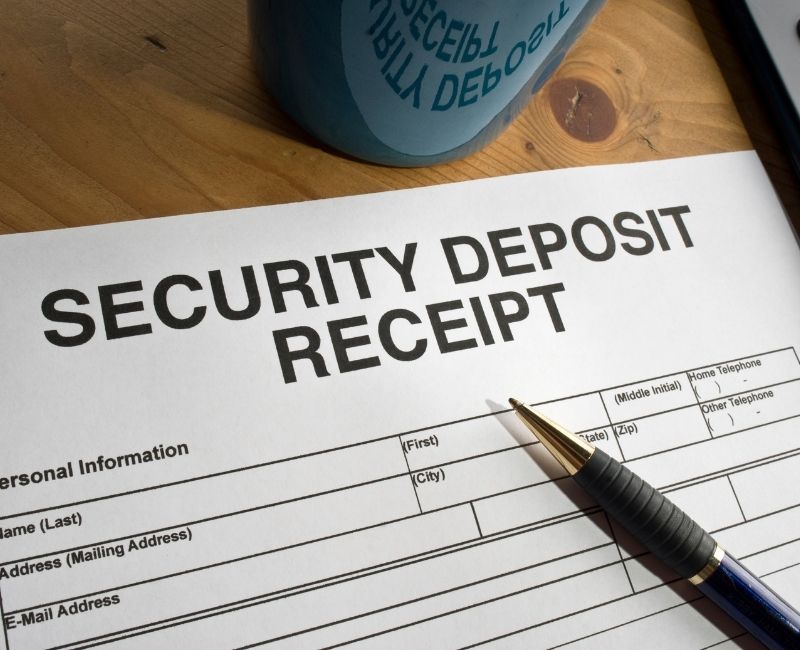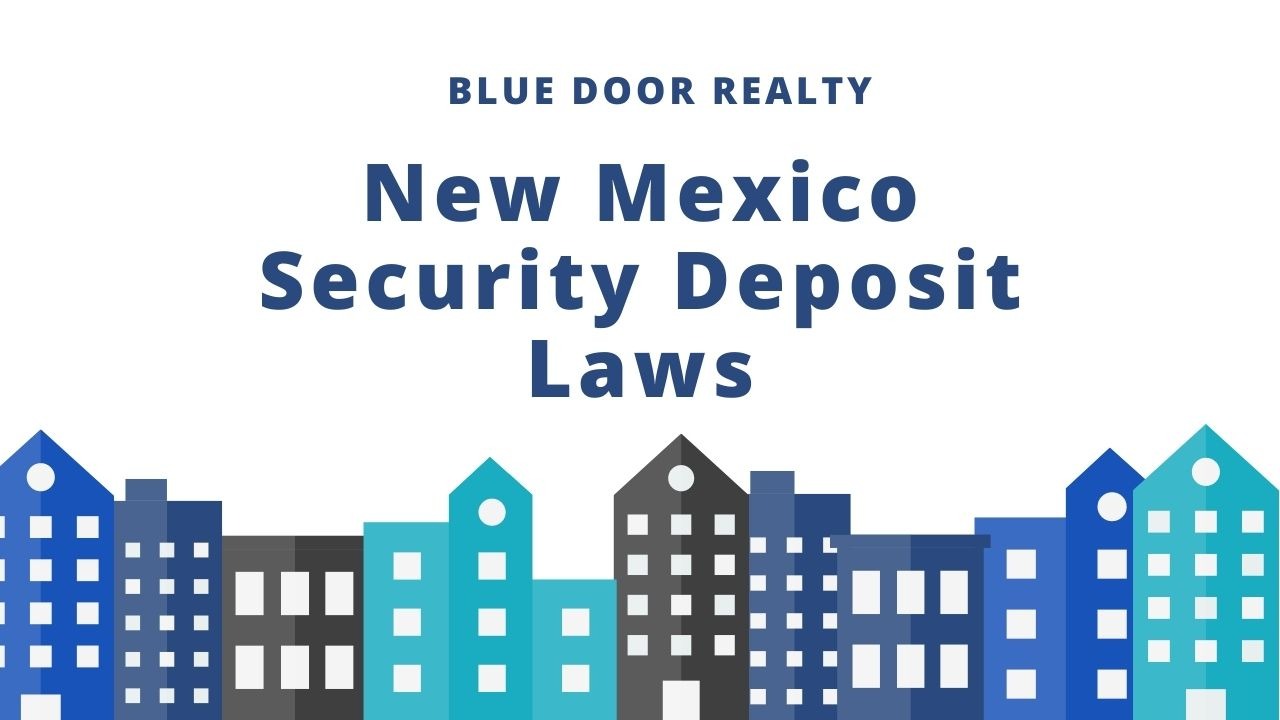As per New Mexico security deposit laws, a landlord in New Mexico has the right to ask for a deposit from their tenant. The deposit acts as financial protection against negligent or careless tenant actions that could lead to financial hardship for the landlord.
A good example of such hardship for the landlord is excessive rental property damage from the tenant that exceeds normal wear and tear. As the landlord, the New Mexico deposit rules state that you would be able to use part or all of your tenant’s deposit to fix the damage to your rental property. This helps keep the rental unit in great condition, which will help the landlord maintain tenant interest.
Besides excessive damage caused by the tenant to the rented unit, security deposits can also help in other situations. Such as, if the tenant stops paying rent, moves out without clearing their utility bills, or breaks their lease without a legally justified reason. The security deposits can be used to help with many unanticipated problems related to the tenant and their rental.
Even though the New Mexico landlord-tenant law is there to help New Mexico landlords, they also have several responsibilities. It’s important that landlords understand New Mexico landlord-tenant laws, and we can help. So, we at Blue Door Realty have put together this article to help every landlord understand the New Mexico security deposit laws. We have an expert team of rental property managers to help manage your rental unit.

Are There Security Deposit Limits?
Yes. New Mexico’s security deposit laws state that for leases less than a year, the maximum security deposit charge a landlord can collect from their tenant would be the equivalent of one month’s rent of the rental unit. But, for a lease agreement that is an annual rental agreement or longer, landlords have the option to collect more than one month’s rent from the tenant. The maximum deposit depends on the lease agreement. However, landlords should have only requested a reasonable deposit cost to maintain tenant interest.
Where Should Landlords Store the Deposit?
As per the security deposits laws, the deposit for the rental unit should be kept in an interest-bearing savings account. But, this rule only applies to leases that exceed a year. In this case, the property owner will need to pay interest to your tenant on the deposit held in the savings account. If the landlord fails to do this, they may face legal complications and disputes with the tenant if they withhold the deposit.
Can Landlords Charge a Pet Deposit?
Yes, the New Mexico’s security deposit laws and New Mexico Landlord-Tenant laws do not cover pet deposits. But while there is a limit on how much a property owner can charge tenants as the deposit. No limit exists for pet deposits. So, a New Mexico landlord has the right to ask for an additional pet deposit from their tenant. Make sure to include this fee in the lease agreement to avoid confusion with tenants.
New Mexico tenants must pay this deposit on top of the security deposit if they wish to live in the unit with an animal. The pet deposit is used to cover extra costs that might occur with animal damages. This needs to be signed in the rental agreement.
New Mexico landlords will generally ask for a pet deposit ranging between one and two months’ rent. Keep in mind that while it is not against New Mexico landlord-tenant law to charge a large amount of money as a pet deposit, an exorbitant charge will not help your landlord-tenant relationship. As an owner, charging too much could deter tenants from signing a rental agreement with you.
Please note that people with disabilities have special rental provisions in the law. According to the Fair Housing Act, disabled persons have a right to full and equal access to housing. It would therefore be discriminative to require them to pay a pet deposit for their service animals during their tenancy. If the landlord fails to abide by the Fair Housing Act they risk facing charges or court costs.

How Can You Use the Security Deposit?
New Mexico landlord-tenant laws and rental laws allow a New Mexico landlord to make deductions to their tenant’s security deposits in certain circumstances such as:
Failure to Pay Rent
Nonpayment of rent is one of the top reasons for deductions from security deposits in New Mexico, according to New Mexico landlord-tenant law and security deposit law. If a tenant stops paying rent for whatever reason, or if they quit the premises without notice, the owner can withhold part or all of their deposit to cover their losses.
The owner may use such a deposit as the security deposit to cover more than one month’s rent.
Clearing Unpaid Bills
In a typical rental agreement, utilities will be in the tenant’s name and not included in the month’s rent. So, it would be their responsibility to ensure they have cleared those bills, as necessary. But, if the tenants move out at the end of the tenancy without clearing these bills they remain liable. New Mexico landlord-tenant law states that the landlord can use part or all of their deposit to clear them.
Cover Lease Violations
Should a tenant fail to report maintenance issues on time, resulting in expensive fixes that could be avoided, the New Mexico landlord-tenant law and deposit laws allow the landlord to use the deposit to cover their costs.
Repair Excessive Damage
When damage occurs because of abuse or negligence by a tenant such as broken windows, holes in the wall, and broken tiles. New Mexico laws allow the landlord to cover their costs using the deposit.
But a New Mexico landlord cannot hold their tenants security deposits for damage resulting from normal wear and tear.
Can a Property Owner Perform Walk-Through Inspections?
Walk-through inspections help document the condition of the premises prior to a tenant moving out. A landlord can use a move-in inspection checklist as a reference to confirm whether any excessive damage has occurred.
If there is damage on the premises, the tenant will need to fix them prior to moving out. If the tenants do not, the landlord may have a right to make appropriate deductions to the tenant’s deposit. The landlord can take the cost out of the deposit and provide the tenant with an itemized list of deductions.
In a few states, walk-through inspections are mandatory. But not the case in New Mexico where they are optional.
When Do You Return the Deposit?
As per the security deposit policy in New Mexico, a landlord has 30 days to return their the security deposit of their tenant upon lease termination if the unit passes inspection and the only damage is normal wear and tear.
If there are any deductions, such as damages (excluding normal wear and tear) or paying a month’s rent, the landlord must include a written statement of which ones were made and the amount for each deduction.
What Can Happen if the Landlord Doesn’t Return the Deposit to the Tenant?
If the landlord wrongfully withholds your tenant’s security deposit during or after the tenancy, there may be the repercussions:
- The landlord may forfeit the entire security deposit amount.
- The landlord may forfeit the right to make any counterclaims regarding recovering the security deposit amount.
- The landlord may be liable for paying your tenant court costs and attorney fees they incurred a resulting lawsuit.
So, per security deposit regulations, it’s in your best interest as a landlord to return such a deposit to the tenant on time after the tenancy.

What Happens if You Sell the Property?
If the owner chooses to sell or transfer the ownership of the unit, New Mexico security deposit policies give two options to consider:
- The current owner can transfer the deposits of their tenant to the incoming owner. In such a case you will then need to notify your tenant of this information.
- The other option would be to return the security deposits back to the tenant (less any allowable deductions). You will then need to notify the incoming owner of this information.
Bottom Line
Understanding the security deposit regulations should be critical to landlords looking to operate in the state. New Mexico landlords need to understand if they should charge one month’s rent for a security deposit, both how and where they need to store their security deposits as well as how and when to return them or make deductions at the end of a tenancy. We offer property management to take away your stress and ensure your property is abiding by the law.
You should also familiarize yourself with New Mexico landlord-tenant laws, rent increase rules, and lease and rental agreement policies. If you have any further questions or interest in property management, it’s always a promising idea to contact an experienced Rio Rancho rental management company such as the team at Blue Door Realty. Contact us today, we would love to be of service!
Disclaimer: This blog post is not a substitute for professional legal advice. Laws change and this article may not be up to date at the time you read it. For expert legal advice please contact a licensed professional.

